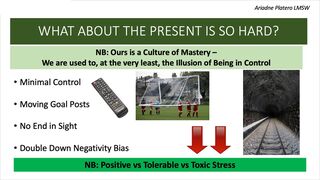Resilience
7 Steps to Greater Resilience
Circumstances may be tough but you can still take stock and reset.
Posted January 19, 2022 Reviewed by Gary Drevitch
Key points
- The ongoing pandemic has made for lack of control on our lives, moving goalposts and no end in sight.
- By refocusing on the positive sides of life and connecting with others, we can gain perspective and move toward resilience.
- Reflecting on things we can be grateful for, engaging in self care, and limiting our goals are keys to coping.

Since I am writing this post in January, I planned on focusing on goals and resolutions. But I am also writing as the pandemic drags into the Omicron phase and what looked like a return to some semblance of normality and control over our lives has been upended, at least for the time being. Everything I am hearing from family and friends and clients is the same: People are tired, fed up, and not managing as well as they were. Me too. To many, it feels to many like the early days of this health crisis, or maybe worse, because we thought we’d have made some progress by now. All the conversations I’m having are not so much about goals and plans, though those are important, they’re about feeling deflated and defeated.
Why are we having such a hard time right now? There are many obvious reasons but it’s helpful to review them and remind ourselves that we’re not being feeble when we feel brought low by the unfolding of a situation outside our control. We are just reacting naturally to our situation.
- We should admit that many of us live in a culture of mastery. It’s important to us. And we’ve had, at the very least, an illusion of being in control, so lack of control is particularly hard for us.
- Having a plan is often our way of dealing with anxieties. The fact that our plans are constantly challenged or obliterated is distressing and lets our previously managed anxiety out of its box.
- The goalposts seem to be moving all the time. Whether we’re listening to the scientists, the politicians, the media, or any of the other chatter out there, what we’re dealing with is always shape-shifting. The rules change, the variants change, the advice and ‘best practices' change. So even if we try to make a plan, we’re not sure what we’re dealing with or working toward.
- There’s no end in sight. There will be a time when things are significantly better or we’ve learned to deal with it better but we don’t know when that will be. This additional layer of uncertainty is really challenging.
- We have a natural cognitive bias that doubles down on the way we’re feeling. If you’re feeling positive, you will naturally see the good in things more easily than you’ll see the bad. Conversely, if we’re leaning toward the negative, then that is what we’ll pick up on in all the news around us. So these days, we’re reinforcing our negative outlook with plenty of negative information.
- There are differing levels of stress and we may be both individually and collectively tipping into a more troubling level. There’s Positive Stress, which allows us to think more sharply and perform better when there’s a lot at stake. And then there’s Tolerable Stress, a level ratcheted up, probably more than we’d usually want, but, with support and focus, we can deal with it and still perform well.
- Finally, there’s Toxic Stress. This is when the stress has gone on for a long time or is at an extremely intense level. When such a situation continues too long, our physical and mental health suffers and we need to find new sources of support or find a way to lessen the stress we’re exposed to so as to avoid long-term damage.

I want to emphasize how important it is not to feel inadequate because we are struggling right now. As you can see from the long list of reasons above — and I could add many others — it is legitimate that we are low in mood, paralyzed, and inundated with feelings of anxiety. In addition, our individual histories, capacities, and experiences with stress and challenges inform our individual responses to this crisis.
So with all this in mind, I think you’ll objectively feel that maybe we should cut ourselves some slack. So, we can agree that it’s not a moral failing that we find ourselves struggling; but how do we rise to the challenge and dig deep for the resilience that we each are capable of? We are having a natural response to all that is going on around us but we’re also not just playthings of circumstances. We can take some steps to feel stronger and activate our natural capacity for resilience. Remember, we are programmed to survive and adapt:
- Remind yourself daily of the things you can be grateful for.
- Focus on regular habits of self-care – exercise, meditation, laughter, friends.
- Reach out to family and friends: Initiate calls or emails, create and enlist ‘your team.’
- Develop a limited number of small goals that you can work toward. Don’t overwhelm yourself; pick a few and keep it manageable.
- Reflect on what is within your locus of control and what lies outside it.
- Develop perspective by practicing seeing things from a bird's-eye view and from others' points of view. Imagine yourself on a balcony looking down on your situation, and literally ask yourself what someone else might think.
- Think particularly of those who might be in a worse situation than you and see if you can offer them support. Helping others has a long-lasting beneficial impact on our brains and reminds us that we can still make a positive difference.
And on the days all of this is difficult, recall that everyone is having the same reaction as you are. Don’t forget: Tomorrow is another day and each day is an opportunity to do things differently and better.


